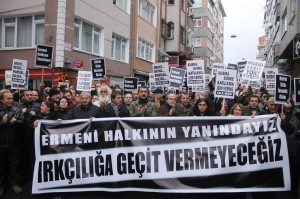Historian Taner Akçam recently told me, “Living in Turkey as an Armenian is an art–the art of survival.” He was right.

Protest against anti-Armenian crimes in
Samatya, Istanbul: ‘We stand together with Armenians, we won’t give way
to racism.’ (Photo shared on Facebook by Halkların Demokratik Kongresi
[HDK])
Samatya is one of the oldest districts in Istanbul. After the establishment of the Turkish Republic they renamed it Kocamustafa Paşa. But many people still use the old name.
Since November 2012, we have been reading reports of attacks against elderly Armenians in the neighborhood. In December, Marissa Kuchuk was killed during one of these attacks. Several followed.
Even the Armenian community doesn’t know the exact number of the attacks, because Armenians are frightened to even say that they were attacked. If there is no considerable harm, they don’t want to talk about it. This silence confuses the public and allows the police and others to argue that the attacks are not hate crimes.
Now let’s dig deeper, reminding ourselves that as of Jan. 31, the police haven’t yet made a single arrest.
The Armenian NGO Nor Zartonk has been following these attacks. Its representative, Sayat Tekir, told me on our TV show (IMC-GAMURC) that they had predicted a rise in hate crimes against Armenians in their report dated November 2012.
Around the same time, Göksel Gülbey, the president of ASIMDER (The Association for fighting against Armenian Claims), was sharing the names and addresses of Armenian schools in Istanbul on his Twitter and Facebook accounts, without providing additional commentary. He was essentially making these schools targets of attacks.
Soon thereafter, a Turkish teacher at the Aramyan Unciyan Armenian School was murdered in his house not far from the school. Yet no one investigated the president of ASIMDER. He soon claimed that he was being threatened by Armenians and asked for protection from the government.
Now let’s return to the attacks in Samatya.
The Aksaray Police Department, which has jurisdiction over Samatya, told Human Rights Association-Istanbul branch representatives on Jan. 23 that the attacks weren’t hate crimes. The police also pointed to the increased police presence in the neighborhood.
Commenting on the most recent attack, which took place on Jan. 23, the police argued that it took place when the policemen in the area were on a lunch break. Let’s assume this statement is true; doesn’t it mean that the assailants knew about the police department’s shifts, and that these attacks were certainly well organized?
In turn, Istanbul’s mayor announced during a Jan. 25 press conference that the city would broaden the investigation to include two other attacks that occurred in the Sisli and Fatih neighborhoods. But, “fortunately,” those two attacks were against two Turkish old women. Essentially, the mayor had figured out a way to argue that the attacks were not racially motivated.
So why are the police and the mayor insisting that these attacks are random and are not hate crimes against Armenians?
Because if the attacks are organized and are targeting Armenians, it means that nationalism continues to be on the rise in this country. It means that the ruling Justice and Development Party (AKP) has failed to address this problem.
It also means that while the AKP was busy with the “deep state” organization Ergenekon, it didn’t give enough importance to the KAFES operation, which was a part of Ergenekon, and targeted Turkey’s Armenians specifically.
The names of many who worked for the Turkish-Armenian weekly newspaper Agos were on KAFES’s murder list. The group also sent threatening letters to Armenian schools in Istanbul.
It would have been much more effective if the mayor had made a statement in support of the Armenian community. This simple gesture would have calmed the community in Samatya a bit.
Armenians in Istanbul want to believe that these attacks were not targeting them specifically. But they also remember what happened in 1915, 1942, and 1955…
And it seems that such attacks or threats are going to continue until 2015, the centennial of the genocide. The upcoming elections won’t help either, because it’s possible that the government will look the other way to win nationalist votes.

No comments:
Post a Comment